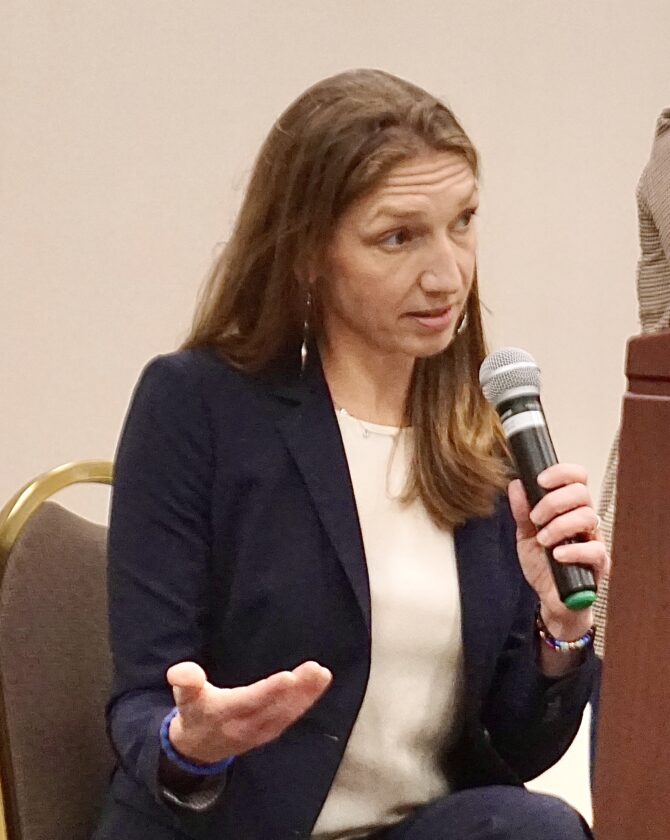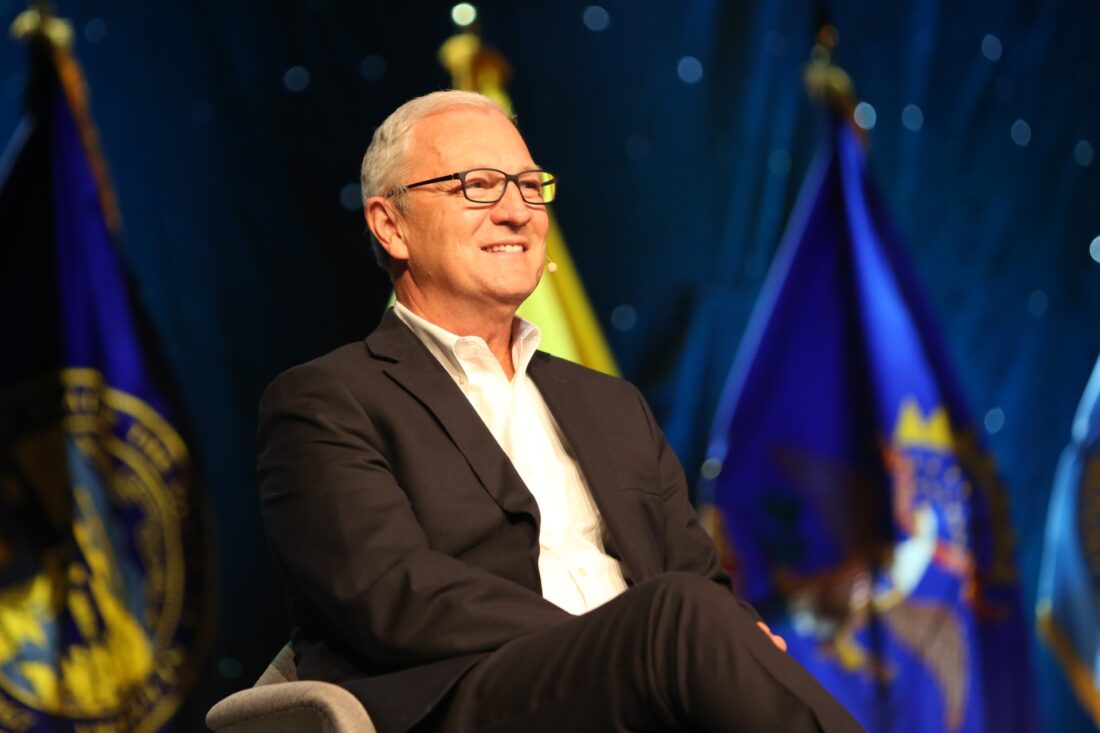US Senate race focuses on working on issues for ND

Jill Schramm/MDN U.S. Senate candidate Katrina Christiansen speaks at a Democratic-NPL forum in Minot Oct. 1.
As the underdog Democrat taking on her second Republican incumbent, U.S. Senate candidate Katrina Christiansen has been running a dogged campaign to unseat first-term U.S. Sen. Kevin Cramer.
In accepting the Democratic-NPL nomination in April, Christiansen spoke of lack of results coming from Cramer, and she has continued to make that part of her message in urging North Dakotans to make a change.
Cramer defends his record in advancing legislation on defense, water and other infrastructure issues that he says make a difference for North Dakota.
Christiansen, an agricultural engineer, is an instructor at the University of Jamestown, although on leave during the campaign. She garnered about 25% of the vote against U.S. Sen. John Hoeven, R-N.D., two years ago. Rick Becker drew about 18.5% in that race, which saw Hoeven reelected with 56.5% of the vote.
If elected on Nov. 5, Christiansen said, “I’m only going to serve two terms, and that second term, everybody had to work really hard to get me to agree to do, because I think once people get into that position, they start to lose sight of why they’re doing it. They start to lose motivation to accomplish things.”

Submitted Photo U.S. Sen. Kevin Cramer is looking to represent North Dakota in the Senate for a second term.
She added congressional representatives need to be held accountable.
“They need to be getting things done,” Christiansen said at a Democratic-NPL forum at Minot State University Oct. 1. “My opponent’s really great at identifying problems and assigning blame, but when it comes to figuring out outcomes, solving a problem, there really isn’t an answer there.”
She lists one bill to rename a building in Fargo as Cramer’s only achievement, but Cramer responds Christiansen’s accusation comes from a lack of understanding of the legislative process in Washington.
He noted he successfully sponsored a bill to restore the name of Sully’s Hill to White Horse Hill on the Spirit Lake Reservation. He was able to gain authorization for the longest extension – 10 years – to the Export-Import Bank in the bank’s history included in an appropriation package in 2019, he said. He sponsored bills that became part of the National Defense Authorization Act, had a role in the development of the 2021 bipartisan infrastructure bill, chaired a subcommittee that has kept the Water Resources Development Act in play and worked to protect and increase highway funding for North Dakota, he said.
Standing up the nation’s space force also was his bill, he said.
“I did it because no one else would, and it was a high priority for the Trump administration,” Cramer said. “Now there’s nobody questioning the wisdom of that move.” The space force program includes the University of North Dakota’s School of Aerospace Sciences and Cavalier Air Force Station, now known as Cavalier Space Force Station.
Among his priorities if elected to a second six-year term are reducing bureaucracy, including halting the Environmental Protection Agency’s rules on waterways and energy sector regulations. Cramer said he wants to address the size of the bureaucracy by trimming budgets and workforce.
Another priority will be to continue pushing for modernization of military assets in North Dakota, Cramer said.
“Make sure Minot remains on the list with ICBM replacement of the Minuteman with Sentinel,” he said. “Those are long term projects but they are critical to American deterrence.”
He added he would work to make tax cuts permanent and finish a farm bill.
“Hopefully we will do a farm bill by the end of the year. My hope is we will get a new farm bill done or we will get an extension of the current farm bill with some ad hoc improvements on the relief side – make sure we have that safety net built up to reflect modern input costs,” Cramer said.
The Southern Border is another priority.
“That fits into the national security budget as well. We can’t have world peace if we don’t secure our border,” he said.
Prior to his election to the Senate in 2018, Cramer served three two-year terms in the U.S. House. He was appointed by then-governor John Hoeven to the Public Service Commission in 2003 and was elected in 2004. His career in public service dates to 1991, when he became chairman of the North Dakota Republican Party. From 1993 to 2003, he served in roles as state tourism director, state Economic Development & Finance director and executive director of the Harold Schafer Leadership Foundation from 2000 to 2003.
Christiansen worked as a plant engineer at an ethanol plant for two years and for a large agricultural processor as a researcher, earning two patents.
In her campaign she has spoken out for extending the Child Care Tax Credit, reducing marketplace consolidation in the livestock industry, enacting tax incentives to combat climate change, securing the Southern border and defending Ukraine from Russia.
Christiansen compared the situation in the Middle East to the period after Sept. 11, 2001, when things were happening so quickly in the name of the war on terror.
“I can’t help but think that maybe some of the same mistakes are being made again in response to the terrorist attack on October 7, but what we as Americans all don’t want is escalation after escalation. We don’t want to end up in a forever war, and I think it’s completely appropriate for us to say we need a ceasefire. We need a return of the hostages,” she said.
Also at the Minot forum Christiansen responded to the public’s questions on drug prices, objecting to manipulation of the marketplace by drug companies.
“It’s not innovation that’s leading to this return on investment. It’s exploitation. So, I think that there are certainly federal policies that we can put into place to make sure that we have this competitive marketplace that benefits consumers and drives innovation,” Christiansen said.
“I have been to all 53 counties in North Dakota, and one of the things that comes up a lot is the cost of insulin, or being able to even access it in smaller communities,” said Christiansen, who offered support for capping insulin prices and eliminating pharmacy managers who serve as middlemen in the process of getting prescriptions to consumers.
Christiansen responded to concerns about economic pressures on American families, including military families.
“I was a kid that grew up on food stamps,” Christiansen said. “My opponent has brought up the SNAP benefit program as being the snag for getting the farm bill passed, not really understanding that 7 percent of North Dakotans need food stamps and that we’re a society, really, since FDR, that has been OK with having safety nets. Rather than talking about how do we improve that, so then our service family members aren’t struggling with food security, we’re fighting over culture issues, or we’re fighting over the idea that there is a safety net.
“We also need to look at the other things in our lives that are costing more. Prices are higher. We need to deal with gouging. We need to deal with the anti-competitive nature of our food supply chain,” she said. “It’s really hard for there to be competition for consumers when there are only a few players, and so we need to deal with antitrust, alongside fully funding those safety nets and then really addressing pay increases, obviously, for service members.”
Both Cramer and Christiansen said they can work with whichever party controls the presidency or Congress after Nov. 5.
Cramer said he is most effective in a divided government. He has worked with Democrats to overturn the administration’s prohibition on fracking, on passing a farm bill and in defense authorization and highway funding, he said. He also co-chairs caucuses with Democrats on adoption, American-Canadian economy and defense modernization.
“If we want to have success, we have to work with the other party,” he said. “If you are not working across the aisle, you are not really working ”
Christiansen said she will represent North Dakota and not a party in Washington. Americans agree on many issues, she said.
“Then there’s probably about 10% to 15% of things we’ve got to compromise or collaborate on, and that’s the piece that we’ve been failing to do,” she said. “The most successful legislation in our congressional history are those bills that had overwhelming bipartisan support, and we’ve somehow forgotten that legacy of production, of being able to do the work of the people.”
- Jill Schramm/MDN U.S. Senate candidate Katrina Christiansen speaks at a Democratic-NPL forum in Minot Oct. 1.
- Submitted Photo U.S. Sen. Kevin Cramer is looking to represent North Dakota in the Senate for a second term.




